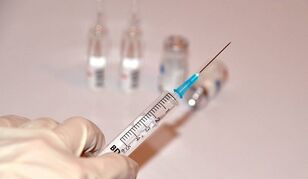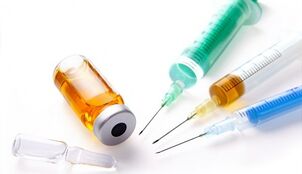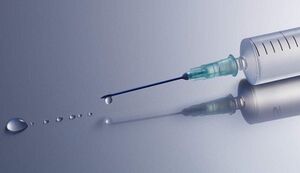
Prostatitis injections are the most effective dosage form. Injections act on lesions faster than tablets or suppositories. But treatment with prostatitis injections is prescribed for special indications, and also has a number of contraindications.
Advantages and disadvantages of injections for prostatitis
To understand what is best for suppositories, pills or injections for prostatitis, you need to consider the benefits of injections:
- Presentation.The active substance enters the bloodstream immediately, reaching the inflammatory center in 5-10 minutes. More time to dissolve tablets and suppositories. This pill works mainly for a long time, because it first needs to go through the digestive tract, absorbed into the blood.
- Ability to use accurate doses.During injection treatment, the entire required concentration of the drug enters the bloodstream. While using the tablet, certain parts of the active ingredient are destroyed under the influence of stomach enzymes.
- Ease of implementation.Injections can be given regardless of the patient's condition. For example, when a patient is tormented by vomiting, and he or she cannot take pills.
Disadvantages of injecting:
- The need for the help of a health professional.
- Problems, procedure pain.
- Risk of infection at puncture site.
- Possible negative side effects with improper injections, for example, redness, inflammation or pus.
Thus, the use of injections to exacerbate prostatitis is far more effective than other dosage forms, but inconvenient for self-treatment.
When injections are prescribed for prostate inflammation
Injections for prostatitis in men are used mainly in the form of acute pathology. It is accompanied by severe symptoms, for example, severe pain, difficulty urinating. Such manifestations significantly reduce the quality of life of patients, therefore, require immediate elimination.
In addition to acute prostate inflammation, injections can be prescribed for:
- forms of chronic prostatitis, if it is of bacterial origin;
- blood stasis in the small pelvis;
- serious erectile dysfunction;
- infertility;
- circulatory disorders in the groin area;
- Infectious organ lesions near the prostate gland.
Injections are often given after surgery on the urinary system.
What injections are given for prostatitis
Injections for prostatitis are prescribed differently, depending on the cause of the development of the disease, the symptoms available. The attending physician should select a group of medications; self-medication with injections is strictly prohibited to prevent the disease from getting worse.
Antibiotics

Antibacterial injections are designed to fight pathogenic microorganisms that provoke the development of inflammatory processes in the prostate. By destroying bacteria, the drug helps to restore the tissue of the affected prostate gland.
It is important to understand that antibiotic treatment should be carried out strictly in the course. Even if the patient feels better, all the symptoms have disappeared, the prescribed number of injections still needs to be resolved. Otherwise, therapy will be considered incomplete, the pathology will return and tend to be chronic.
Painkillers
Injections for pain in prostatitis in men are usually prescribed for acute pathological forms, as they are accompanied by severe painful sensations. Such injections are performed if the syndrome is so severe that the patient is unable to go to the toilet completely and even sit or move.
Such a drug relieves pain syndrome, normalizes the condition of prostate tissue, relieves cramps. But their long-term use is not allowed. The average duration of therapy is 1-3 days.
Immunomodulator
Immunomodulators are designed to support immune system function. They are used more often in the form of chronic prostatitis, if the body is no longer able to fight pathogenic microorganisms independently.
It should be noted that doctors are still debating whether the use of immunomodulators is allowed. It is believed that the effects of these drugs on the body are unpredictable. Ideally, before giving treatment to a doctor, the treating physician should conduct an immunological study.
Anti-inflammatory
Prostatitis is an inflammatory process in the prostate gland. It is the main effect that should be given during treatment. Therefore, anti-inflammatory drugs are a major component of therapy.
Doctors prefer injections for chronic and acute prostatitis such as Diclofenac and Ibuprofen. They can quickly eliminate inflammation, as well as relieve pain and fever.
Dekongestan
When inflamed, prostate tissue swells. Decongestant injections can normalize the condition. Their active ingredient is testicular hyaluronidase, which is obtained from the testicles of cattle.
The drug softens connective tissue, improves blood flow, relieves swelling of the prostate gland, and prevents scarring. The course of therapy is 10 days, one injection per day.
Hot injection

The use of hot injections to treat prostatitis in men involves the introduction of special drugs into the bloodstream. This name is given for the injection because after that the patient feels a strong heat all over the body. This ingredient helps relieve inflammation, eliminating the symptoms of the disease.
It should be noted that contact with skin can cause tissue damage. The dose is determined by the attending physician. If not observed, nausea, a sharp drop in blood pressure, and loss of consciousness may occur.
Aloe vera injection
Among the cheap and effective injections for prostatitis, aloe injections are observed, which help achieve the following results:
- improves blood circulation in the small pelvis, reduces blood viscosity, which makes it possible to eliminate congestion, normalize the nutrition of prostate tissue;
- to destroy pathogenic microorganisms that cause inflammation in the prostate. Therefore, injections are often given in conjunction with antibiotic therapy to enhance the effects of antibiotics;
- removes inflammation in affected organs;
- strengthens the immune system, which accelerates the recovery of men.
Aloe vera injection is prescribed in a dose of 1 ml per day. The duration of treatment is one month. If necessary, repeat the course after a 2-week break. In chronic inflammation of the prostate, it is recommended to undergo therapy for 3-4 months.
Contraindications to injections
Even the best injections for prostatitis have a specific list of contraindications, depending on its active ingredient. Among the general restrictions for all injections, one can remove muscle tissue atrophy, damage to the skin and subcutaneous fat at the puncture site. If you do not take into account the contraindications, there is a risk of various diseases or their deterioration, as well as allergic reactions.
Therefore, injections in the treatment of prostatitis are given in acute form, when necessary to immediately eliminate the symptoms of the specified disease. In other cases, rectal suppositories and tablets are used.
























